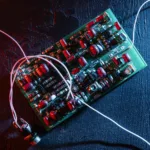
Introduction
With the plethora of drill models available on the market with different specifications and features, buying the right drills can be challenging and time-consuming. Whether you’re a DIY enthusiast looking to enhance your tool collection, a professional needing to upgrade your equipment, or simply someone handling occasional home repairs, finding the perfect drill is crucial. This comprehensive guide simplifies your buying process, providing you with all the information you need to make an informed decision when purchasing a drill.
A Brief Overview of Drills
Powertools are versatile, manual tools explicitly designed for making holes or driving fasteners into various materials such as wood, metal, or plastic. They come in multiple types, each suited to different tasks and environments. The working principle of a drill involves a motor that turns a bit at high speeds on given surfaces or materials. Drill bits – the cutting tools attached to drills – vary in shapes, materials, and sizes, depending on the material they are designed to penetrate. Many drills provide additional functionalities, such as hammering action for drilling into masonry and adjustable torque settings for driving screws, making them indispensable tools in both professional construction and home DIY projects.
The Significance of Considering Drill Parameters Before Buying One
Choosing the right drill can make all the difference. It involves balancing your specific needs with the features offered by different types of drills. By considering various selection criteria and desired features, you can confidently choose a drill that meets your needs and empowers you to tackle any project with ease. Remember, a good drill is an investment that can make your work easier and more efficient and can save you long-term money for years to come.
Understanding Different Types of Drills
There are a plethora of powertools available in the market–and before diving into the specifics of purchasing a drill, it’s essential to understand the most common types available:
Corded Drills
Corded drills, also called electric drills or power drills, are powerful tools ideal for continuous drilling. They are generally more powerful and efficient and can handle more intensive tasks like mixing concrete or heavy-duty drilling. The main limitation is the power cord, which can restrict mobility unless you have an extension cord.
Cordless Drills
Cordless drills offer excellent mobility and are perfect for working in areas without direct electrical outlets. They run on rechargeable batteries, usually lithium-ion, which have improved considerably over the years in terms of longevity and power output. The downside is that battery life can be limiting, and having spare batteries is often necessary for larger projects.
Hammer Drills
Hammer drills are designed to handle tough materials and combine rotation with a hammering action to provide rapid thrusts that pulverise hard materials effectively. These are excellent for construction and renovation projects where durability and strength are required.
SDS Drills
SDS drills are powerful rotary hammers designed for heavy-duty tasks. They are unique because of their special chuck system, which uses slots in the drill bits to allow them to move back and forth, providing a hammering function. Our comprehensive guide provides complete information about SDS drills.
Impact Drivers
Impact drivers are high-performance tools used for driving screws and bolts. They deliver a strong rotational force and are particularly useful for tasks that involve dense materials. Unlike the standard ones, impact drivers can handle long fasteners more efficiently.
Key Features and Parameters to Consider When Buying a Drill
Choosing a perfect drill mainly involves considering the performance, balancing the budget, and ascertaining the physical features of the drill. When choosing a drill, consider the following features and parameters to ensure you get a tool that meets your needs.
Assess the Task
Determine what you’ll predominantly use the drill for to narrow down the type.
Setting a Budget
They can vary significantly in price based on type, brand, and features. Setting a budget before shopping can help narrow your choices and focus on the models that offer the best value for your needs.
Comfort and Ergonomics
Since handling a drill can be physically demanding, finding a model with ergonomic features is essential. Look for drills with a comfortable grip and a design that feels balanced in your hand to help reduce fatigue during extended use.
Consider Frequency of Use
How often will you use the drill? Frequent use demands a more durable, powerful model.
Chuck Size
The chuck size determines the drill bit’s maximum diameter that the drill can accommodate. Common chuck sizes range from 1/4 inch to 1/2 inch, with larger sizes accommodating larger bits for heavier tasks.
Power and Torque
Evaluate the drill’s power rating to indicate greater drilling and driving capabilities. Consider drills with adjustable torque settings to prevent over-tightening or stripping screws.
Speed Settings
Look for drills with variable speed settings to adjust the speed according to the material being drilled or the task at hand. Opting for drills with multiple speed settings provides greater versatility.
Battery Life and Charging Time
Battery life is a crucial consideration for cordless drills. Look for models with lithium-ion batteries that offer a balance between weight and power. Also, consider the charging time; some newer models come with fast chargers that can significantly reduce downtime.
Additional Features
Some drills come with extra features like built-in LED lights, which are helpful in low-light conditions, built-in levels for accurate drilling, or keyless chucks for quick and easy bit changes.
Warranty
It is recommended to always check the warranty period of the product before making a purchase.
Consider the Brand Comparison When Buying Drills
Choosing a reputable brand ensures quality and reliability. Here are some top brands to consider:
- DeWalt – DeWalt is known for its robust and durable tools, including drills. They are favoured by professionals for their power and reliability.
- Makita – Makita offers a wide range of high-performance drills with advanced features. They are known for their innovation and ergonomic designs.
- Bosch – Bosch drills are praised for their precision and versatility. They offer a good balance of power and control, suitable for both professionals and hobbyists.
- Milwaukee – Milwaukee is renowned for its heavy-duty tools. Their drills are powerful and durable, designed to withstand harsh job site conditions.
- Ryobi – Ryobi provides affordable yet reliable tools, making them an excellent choice for DIY enthusiasts. Their drills offer good performance at a budget-friendly price.
How Can I Match the Drill to My Needs?
Not all drills can perform specific tasks, and selecting the right drill also involves matching its capabilities to your particular needs. When looking to purchase the drill, ascertain the following considerations and specific drills for particular applications.
Drills for DIY Projects
For basic home improvement tasks, a cordless drill with moderate power and battery life will suffice. Look for a model that offers versatility and ease of use.
Drills for Professional Use
Professionals need powerful, durable drills that can handle demanding tasks. Corded or high-voltage cordless drills with long-lasting batteries are ideal for continuous use.
Heavy-Duty Application Drills
A hammer drill is necessary for drilling into concrete or masonry. Ensure it has sufficient power and impact rate to handle tough materials.
Drills for Precision Work
For precise drilling, such as in woodworking or metalworking, a drill press offers the accuracy and control needed. Look for features like adjustable speeds and depth stops.
Where to Buy the Best Drills? Exploring the Popular Platforms
You can easily buy drills at hardware stores, home improvement stores, and online platforms. Physical stores allow you to handle the tool and sometimes even try it out before buying, while online stores, such as Amazon, Enrgtech, and Screwfix, offer better deals and better after-sales support that can help inform your decision from the comfort of your home.
Bottom Lines
Buying a drill involves careful consideration of your specific needs, its features and specs, and your budget. Whether you opt for a powerful corded model, a versatile cordless option, a rugged hammer drill, or a forceful impact driver, following this guide will help you make an informed decision and select a drill that will serve you well for years to come.





















